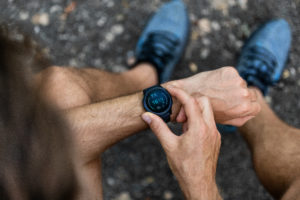
What to wear: Finding a fitness tracker fit for purpose
If you’re a fitness fanatic, it’s likely you have already invested in the modern tool for monitoring your efforts. And you’re not alone - according to Deloitte Consumer Trends 2021 report, one in five Australians own a wearable fitness tracker.
But if you’re kicking off 2022 with an action plan that includes a whole lot more exercise, you may be curious about their benefits. Is it worth adding a fitness tracker to your get-fit arsenal? What do they actually do? And how will they help you reach your goals?
Here’s a quick rundown of this ever-developing market to help determine what works for you.
How fitness trackers work
We all know what a fitness tracker is, but do you know how it, er, tracks your fitness? Fitness trackers have an accelerometer and gyroscope to track your movement. The former tracks how fast you’re moving; the latter tracks the direction or orientation of your movement. Together, they tell the fitness tracker how you are moving through space. It is also referred to as axes: back and forth, side to side and up and down. Besides movement tracking, some, if not most, activity monitors are also equipped with other sensors. Some can monitor pulse and heart rate. Some have optical scanners to see our capillaries. While others use weak electric current to gauge our heartbeat and breath rate. The more sophisticated, the more sensors they have, which means more data collection and better accuracy.

All this data is then stored in the tracker's brain, also known as the microprocessor. It then sends the data to your phone screen via an app through graphs and numbers. These are helpful in making an informed decision about your fitness.
Did you know that the latest iteration to some of these activity monitors could help detect an undiagnosed heart problem?
An Apple-sponsored study commissioned almost half a million individuals to wear an Apple Watch in 2019. None had been diagnosed with atrial fibrillation, more commonly known as irregular and rapid heartbeat. It’s a serious medical condition that, if left untreated, may lead to stroke.
The watch alerted more than 2000 to an irregular pulse, with 84 per cent subsequently being diagnosed with atrial fibrillation.
Last September, the American Heart Association journal published the Apple Heart Study, concluding that the watch’s electrocardiogram feature can detect serious cardiac irregularities.
The Apple Watch has been capable of detecting hard falls since 2018. Now it has a feature that enables it to detect them during workouts. This means if you take a tumble while you’re out cycling and don’t respond when the watch messages to see if you’re OK, it will alert emergency services and your emergency contacts. Samsung has also improved the fall detection on its Galaxy Watch4. Other fitness brands can now detect body composition, blood pressure, the amount of oxygen in your blood (very helpful in the pandemic) and so on.
What this means is the features and functionalities that were once the domain of sci-fi movies are now a reality. Perhaps fitness trackers will soon detect if we’re falling for the wrong person? Wishful thinking, or is it…
How accurate are they?
If fitness trackers can track our fitness, how fit is the tracking the fitness trackers track?
The results are varied. Three studies published in September 2019, July 2020, and December 2020 concluded that activity monitors can accurately count steps at normal walking speeds, at least in controlled environments. Trackers miscounted – either undercounted or overcounted – steps at slow and/or fast walking speeds.

When it comes to our beating hearts, two studies conducted two years apart (April 2018 and April 2020) both deduced that the activity monitors used in their studies ”generally produce accurate heart rate readings irrespective of the age of the user”.
Sadly, the same cannot be said for measuring calories burned.
According to a study published in April 2018, “measurement accuracy of energy consumption is still inadequate”. This conclusion is echoed by two other research papers published in September 2019 and March 2020. The studies concluded “the current wrist-worn activity trackers are most likely not accurate enough to be used for either purpose in sports, or in health care applications” and “wrist and arm-worn devices differ in accuracy depending on activity type,” respectively.
As technology develops, these features will undoubtedly improve. But it’s important to note that we should never rely on these devices to assess our health. That’s what doctors are for.
What are the leading fitness tracker brands?
If you’re thinking of investing in a good fitness tracker, do your homework. They are not cheap. Ask your running or cycling mad friends for recommendations and weigh up the pros and cons, depending on your needs. Here are some of the more popular brands:
-
- Apple Watch Series 7. Several tech experts rate this as the best smartwatch cum fitness tracker overall. Series 7 has more than 10 quick-start workout modes. You also have the ability to add workouts of your choice via the Workout app. Apple Fitness Plus has more than a hundred options to choose from.
- Fitbit Charge 5. By far this is Fitbit’s most advanced fitness tracker at its price point. It may not have a Spotify feature, but it’s got more impressive health features previously available only in more expensive counterparts.
- Garmin Vivoactive 4. If you’re after the marriage of form and function, this activity monitor fits the bill. Not only is it feature-rich, but it also has the essential health-monitoring capabilities. It also have a Near-Field Communication (NFC) chip. So, you can use this watch for file transfers or mobile payments. Sleek and stylish, it’s also a wearable you actually want to wear!
- Fitbit Versa 3. If your blood oxygen level worries you a lot, this fitness tracker is for you. Besides offering everything you’ve come to expect from a fitness tracker, Versa 3 offers an impressive sleep tracking feature. Its SPo2, aka oxygen saturation, the sensor could tell if you have breathing problems, such as sleep apnea.
- Samsung Galaxy Watch4. The first smartwatch to offer body composition analysis, using a process called bioelectric impedance analysis (BIA). Watch4 sends a weak electric current through your body. This is to assess how badly you might need to stick to a diet and exercise regime.
Common complaints
Fitness trackers are not immune from issues. One of the biggest is privacy. According to The Guardian, “an analysis by New York Times found that 13 out of 20 health and fitness apps shared data with an average of three third-party trackers, many of which passed data to advertisers”. If you’re concerned about your data being onsold, find out which brands have the greatest protection, or avoid them altogether.

Despite being designed to make us healthier, fitness trackers can also have a negative effect on our behaviour. An S&P Global Market Intelligence report said one of these behaviours is an over-monitoring syndrome or the tendency to track fitness activity while losing sight of the overall fitness goals. Others even develop an addiction to exercise.
Then, of course, there are the usual technological issues. Common problems are the fitness tracker is not charging properly or not even turning on. The good news is these issues are relatively easy to fix. When your activity monitor is not charging, the common culprits are dirt, moisture and faulty port or charging cable. If cleaning and restarting the device doesn’t help, you may have to replace the charger. So, lodge a complaint with us if it won’t turn on despite being fully charged.
If your fitness tracker is not measuring up…
For the most part, fitness trackers should do their job. They should help you to monitor your fitness and health. However, they should never be considered a substitute for a proper assessment with a medical professional. You just need to do your research to find one that is reliable and fits your needs. If buying based on reviews from other users, make sure you’re not relying on fake testimonials.
If you've bought a fitness tracker that doesn't live up to the hype, its price tag - or worse, it’s counterfeit – we can help you help you handle it.






